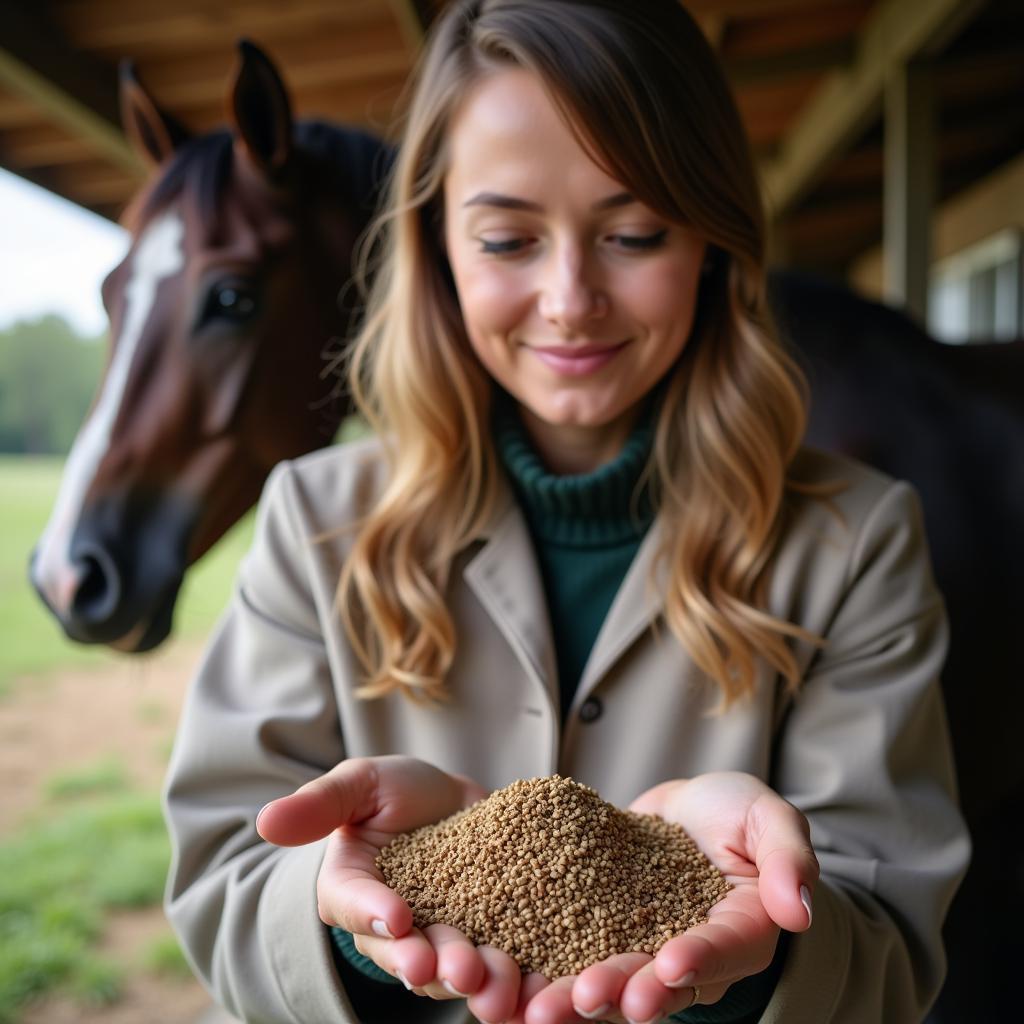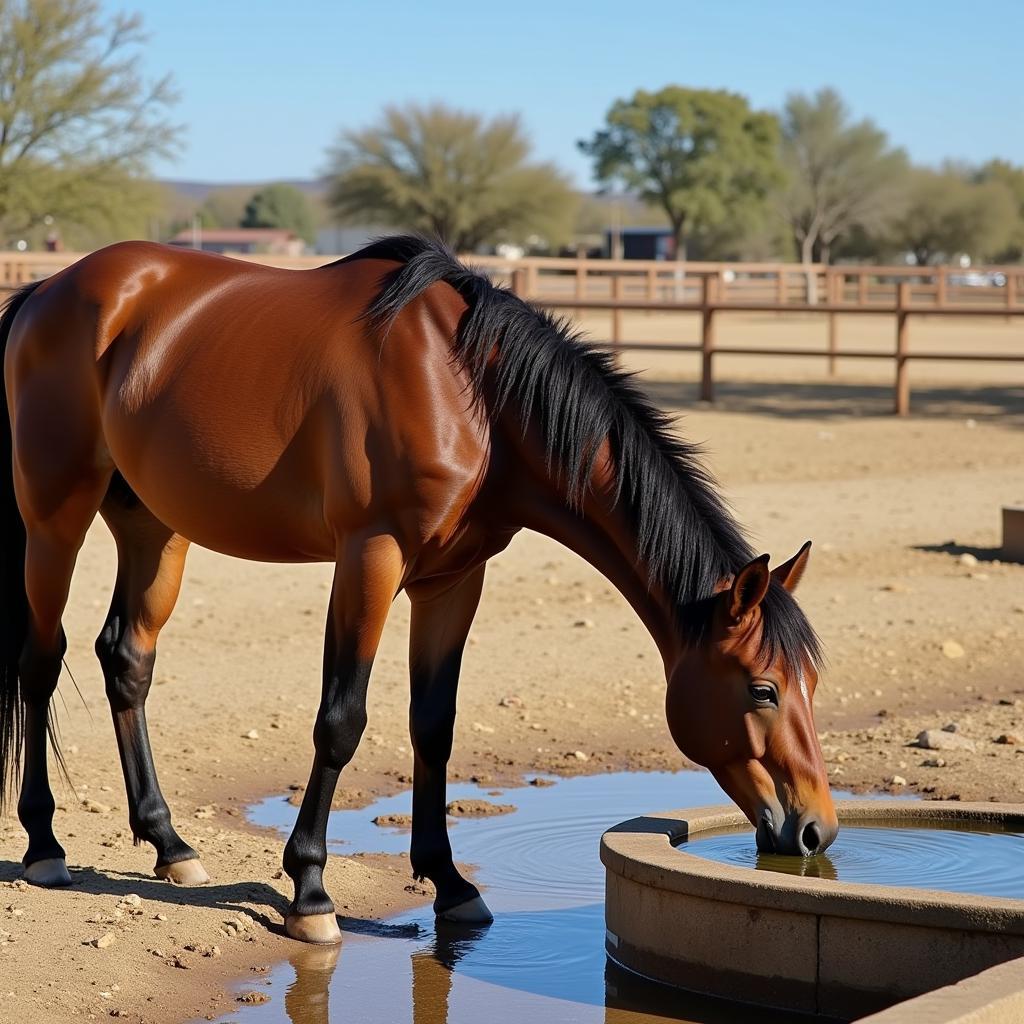Finding the One And Only Horse Feed that magically solves all your equine nutritional needs can feel like searching for the Holy Grail. It’s a common desire among horse owners to simplify feeding, but the truth is, a “one-size-fits-all” approach rarely works. Just like humans, horses have unique dietary requirements based on age, activity level, breed, and overall health. So, while the concept of a single, perfect horse feed is appealing, let’s delve into the complexities of equine nutrition and explore what truly constitutes a balanced diet. Are you feeding your horse horse oats?
Decoding Your Horse’s Dietary Needs
Understanding your horse’s individual requirements is the first step towards creating a suitable feeding plan. A young, growing horse, for instance, has different nutritional needs compared to a senior horse. Similarly, a performance horse requires a higher calorie intake than a leisure horse. Factors like metabolism and even environmental conditions play a role. Consult your veterinarian or an equine nutritionist to determine the optimal balance of nutrients for your horse, taking into account their specific circumstances. This personalized approach is much more effective than relying on a generic “one and only horse feed” solution.
Essential Nutrients for Equine Health
Horses require a balanced combination of forage, concentrates, vitamins, and minerals. Forage, such as hay or pasture, forms the foundation of their diet and should constitute the majority of their intake. Concentrates, like grains and commercially prepared feeds, can be added to supplement the diet, particularly for horses with higher energy demands. Vitamins and minerals are crucial for various bodily functions and must be provided in appropriate amounts. Thinking about making some horse cookies recipe? Remember, treats shouldn’t replace a balanced diet.
The Pitfalls of the “One and Only” Approach
While the convenience of a single feed is tempting, relying solely on it can lead to nutritional imbalances. Every horse is different, and a one and only horse feed may not cater to the unique needs of your companion. This approach can lead to deficiencies in some nutrients and excesses in others, potentially causing health issues. Furthermore, horses can become bored with the same feed day after day, leading to decreased appetite and potential weight loss.
Tailoring Your Horse’s Feed Regimen
Instead of searching for the elusive “one and only horse feed,” focus on building a customized feeding plan. Start with good quality forage and supplement it with concentrates, vitamins, and minerals as needed. Consult with your veterinarian or equine nutritionist to create a tailored program that addresses your horse’s specific requirements. They can help you determine the right balance of nutrients, including protein, carbohydrates, fats, vitamins, and minerals.
 Equine Nutritionist Examining Horse Feed
Equine Nutritionist Examining Horse Feed
Is There Ever a Place for a “Complete” Feed?
In some cases, a complete feed, designed to provide all the necessary nutrients in one package, can be a convenient option, especially for horses with specific dietary restrictions or medical conditions. However, even with complete feeds, it’s crucial to monitor your horse’s condition and adjust the feeding plan as needed. Consider offering a variety of forage sources, like different types of hay, to promote healthy digestion and prevent boredom. You can also incorporate oats horse feed as part of a balanced diet.
Beyond the Feedbag: Other Important Factors
Remember, proper nutrition involves more than just choosing the right feed. Providing fresh, clean water at all times is essential for your horse’s hydration and overall well-being. Regular exercise and turnout time are equally crucial for maintaining a healthy weight and promoting mental stimulation. Do you know why do horses eat soil? Sometimes, unusual eating habits can indicate a nutritional deficiency.
“A balanced diet is the cornerstone of equine health,” says Dr. Emily Carter, DVM, specializing in equine nutrition. “While complete feeds can be useful in certain situations, a tailored approach is always preferable, especially for horses with specific needs.”
 Horse Drinking Water from a Trough
Horse Drinking Water from a Trough
Conclusion
While the allure of a one and only horse feed is understandable, it’s vital to prioritize a personalized approach to equine nutrition. By understanding your horse’s unique requirements and working with a qualified professional, you can create a balanced and effective feeding plan that supports their health and well-being. Remember, there’s no magic bullet when it comes to horse feed, but with careful planning and attention to detail, you can provide your horse with the optimal nutrition they deserve. Looking for a best wireless camera for inside horse trailer?
FAQ
- What is the best type of hay for my horse?
- How much grain should I feed my horse?
- What are the signs of a nutritional deficiency in horses?
- Can I feed my horse treats?
- How often should I deworm my horse?
- What are the signs of colic in horses?
- How can I ensure my horse is getting enough water?
More Help for You and Your Horse
Need more information on horse care and nutrition? Check out these articles on our website:
- Horse Cookies Recipe
- Best Wireless Camera for Inside Horse Trailer
- Oats Horse Feed
- Horse Oats
- Why Do Horses Eat Soil
For personalized advice and support, please contact us:
Phone: 0772127271
Email: [email protected]
Address: QGM2+WX2, Vị Trung, Vị Thuỷ, Hậu Giang, Việt Nam.
We have a 24/7 customer service team ready to assist you.